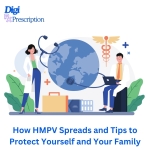
How HMPV Spreads and Tips to Protect Yourself and Your Family
Human Metapneumovirus (HMPV) is a respiratory virus that affects people of all ages but poses a greater risk to young children, older adults, and those with weakened immune systems. While it may not be as well-known as the flu or RSV, HMPV is a leading cause of respiratory infections worldwide. Understanding how it spreads and taking preventive measures can help protect you and your loved ones from this contagious virus.
What is HMPV?
HMPV is a virus that primarily causes respiratory infections. It was first discovered in 2001 and belongs to the same family of viruses as respiratory syncytial virus (RSV). HMPV infections can range from mild cold-like symptoms to more severe illnesses such as pneumonia or bronchitis.
Common Symptoms of HMPV:
- Fever
- Cough
- Nasal congestion
- Sore throat
- Wheezing or shortness of breath
- Fatigue
How Does HMPV Spread?
HMPV is highly contagious and spreads in ways similar to other respiratory viruses. Here are the primary ways the virus is transmitted:
-
Close Contact with Infected Individuals:
- The virus spreads through direct contact with respiratory secretions from an infected person, such as saliva, mucus, or droplets from a cough or sneeze.
-
Touching Contaminated Surfaces:
- HMPV can survive on surfaces for several hours. Touching a contaminated surface and then touching your face, mouth, or nose can lead to infection.
-
Airborne Transmission:
- Inhaling respiratory droplets containing the virus, especially in crowded or poorly ventilated areas, increases the risk of infection.
-
Contact with Infected Objects:
- Sharing utensils, towels, or other personal items with an infected person can facilitate the spread of the virus.
Who is at Risk?
While HMPV can affect anyone, the following groups are at higher risk of severe illness:
- Children under 5 years old
- Adults over 65 years old
- Individuals with chronic medical conditions (e.g., asthma, COPD, or heart disease)
- People with weakened immune systems
Tips to Protect Yourself and Your Family
Preventing the spread of HMPV requires adopting simple hygiene and lifestyle measures. Here are some tips to stay safe:
1. Practice Good Hand Hygiene
- Wash your hands frequently with soap and water for at least 20 seconds.
- Use hand sanitizer with at least 60% alcohol when soap and water are unavailable.
2. Avoid Close Contact with Sick Individuals
- Keep a safe distance from people who show signs of respiratory illness.
- Avoid sharing personal items such as utensils, cups, or towels.
3. Disinfect Frequently Touched Surfaces
- Regularly clean and disinfect surfaces like doorknobs, light switches, and electronic devices to eliminate the virus.
4. Practice Respiratory Etiquette
- Cover your mouth and nose with a tissue or your elbow when coughing or sneezing.
- Dispose of used tissues immediately and wash your hands afterward.
5. Maintain a Healthy Lifestyle
- Eat a balanced diet, exercise regularly, and get enough sleep to boost your immune system.
6. Stay Home When Sick
- If you or your family members exhibit symptoms of HMPV, stay home to prevent spreading the virus to others.
7. Wear a Mask in Crowded Areas
- Consider wearing a mask in crowded or poorly ventilated areas, especially during peak respiratory virus seasons.
8. Encourage Children to Follow Hygiene Practices
- Teach children to wash their hands, avoid touching their faces, and cover their mouths when coughing or sneezing.
What to Do If You or a Family Member Gets Sick
If you or a loved one experiences symptoms of HMPV, take the following steps:
- Stay Hydrated: Drink plenty of fluids to stay hydrated.
- Rest: Allow your body time to recover by getting plenty of rest.
- Use Over-the-Counter Medications: Medications like acetaminophen or ibuprofen can help reduce fever and relieve symptoms.
- Monitor Symptoms: Watch for signs of severe illness, such as difficulty breathing, high fever, or persistent coughing. Seek medical attention if symptoms worsen.
Conclusion
HMPV is a common yet often overlooked respiratory virus that can cause significant illness, especially in vulnerable populations. By understanding how it spreads and taking proactive measures, you can protect yourself and your family from infection. Practicing good hygiene, staying home when sick, and maintaining a healthy lifestyle are simple yet effective ways to minimize the risk of HMPV and other respiratory illnesses.
